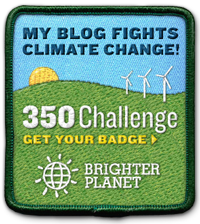Global warming. If you haven't heard about it, you've been living under a rock. If you don't believe it's happening, you're probably living under a rock. And even if you don't believe it's happening, the rest of the world does, and that's going to impact you when resources start getting short.
While small things won't save the earth, they're a step in the right direction. And here's some small steps you can take.
(1) Eat vegetarian one day a week (or one more day a week than you already are.) Raising meat, particularly beef and pork, generally have a horrendous effect on the environment. The good news? It's cheaper to eat vegetarian and better for your health.
(2) Stop drinking bottled water. Tons of petroleum products go into the manufacture of the bottles, and the water is less regulated than tap water. The good news? It's cheaper to use a refillable bottle.
(3) Walk/bike/take public transit one (more) day a week. The good news? It's cheaper and you'll get more exercise.
(4) Seal your home better with caulk and insulation. The good news? It's cheaper than paying the utility and you and your family will be more comfortable.
See? No messy mercury-based CFLs or buying hybrid cars or anything. All stuff that's easy and cheap and good for you. So even if you don't believe global warming is happening, you win.
Subscribe to:
Post Comments (Atom)





4 comments:
Yup. Love all the stuff whereby you end up saving money! (And those CFLs DO freak me out a bit.) :-)
CFLs are a good interim solution until LED lighting gets cheap enough. Not all CFLs are created equal, which doesn't help their general reputation. Some of the cheap ones wear out faster than they're supposed to, are slow to warm up, buzz, etc. But we've got some CFLs that we've had for years with no problems.
Hey, Gene. First, I'm going to say there's absolutely nothing wrong with your suggestions. I do them myself, for the most part. On the vegetarian thing, alas, I have a wife with late onset a bean AND nut allergy, so it's not as easy for us, but we still will have bread and cheese and greens dinners and just salads with regularity. One thing folks should try to do is to source their beef, pork, chicken, and fish locally. You'd be surprised at what you can find if you look. I discovered that a butcher a few blocks from us gets his fantastic beef from about 12 miles south of us and his poultry about 7 miles down the road--and it's CRAZY cheap. So, I know I'm getting responsibly raised beef and poultry, and it's traveling less far to get in my belly than many folks travel to get to Whole Foods. :)
Another tip: put your lights on dimmers. You're going to use much less electricity that way, AND your bulbs are going to last about 2-3times longer, which saves on the energy needed to manufacture new ones.
I could go on, and probably will on our blog, but I wanted to establish myself as environmentally conscious. With that said, I have to tell you, there is very good reason to be a "Global Warming" Skeptic (one need not live under a rock). By that I mean, skeptical about the degree of warming (satellites show no warming for 12 years and cooling for 10), and the man-made component of whatever warming we are seeing. I have put together a voluminous piece outlining SOME of the reasons for my position, and providing the peer reviewed research supporting it, here http://www.traders-talk.com/mb2/index.php?showtopic=113716.
None of this means that we shouldn't be efficient and responsible with our power uses and choices, but it does mean that it might make sense to think critically (even cynically) about some of the "green" issues and prescriptions.
The last decade was the warmest on record, the Arctic ice the smallest on record, and the Antarctic ice sheet has huge pieces breaking away. And perhaps you've seen the logic for doing something about global warming, i.e., the cost of taking action and being wrong is much less than the cost of doing nothing and being wrong. But even if you still don't believe the evidence and the logic, as you say, it still makes sense to use our resources wisely. And I agree you should be careful about "green" -- while there are a lot of good products and services out there, there's also a lot of "greenwashing".
Post a Comment